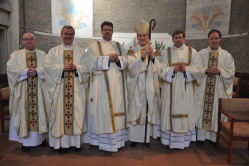Reflection on male priesthood

Fr Stephen Wang
As Catholic Women's Ordination launches its bus campaign, the Dean of Studies at Allen Hall Seminary, Fr Stephen Wang, offers a reflection on the male priesthood: Popes, Priesthood, and Patriarchy.
Last year the religious slogans on London's buses were hesitant and ended with gentle exhortations: "There's probably no God. Now stop worrying and enjoy your life." Now they end with a shout: "Pope Benedict - Ordain Women Now!"
The latest posters, timed to coincide with the Papal visit, are funded by the campaigning group Catholic Women's Ordination. It's unlikely that Pope Benedict will be using his Oystercard, but the hope must be that if his Popemobile gets stuck in traffic, one of these buses will glide by and catch his attention.
The Catholic insistence that only men can be ordained as priests is incomprehensible to many people, and the cause of much personal anger and ecumenical heartache. Pope John Paul II seemed to close the door to any revision when he wrote in 1994 that this teaching "is to be definitively held by all the Church's faithful".
He took a surprising line. He didn't stamp his feet and shout: I won't! Instead he said: I simply can't. I don't have the authority to change something that has been such a fundamental part of Christian identity from the very beginning. The argument is not about holding onto the past for its own sake, but trying to be faithful to what Jesus wanted for his Church.
In the New Testament, Jesus chose twelve men to represent him as his first priests, as the Twelve Apostles. Every generation of Catholics (and Orthodox) since then has understood this to have been a choice that was deliberate and significant, not just for that first period of history, but for every age.
Some argue that Jesus couldn't have done otherwise in the Jewish society of his time. This doesn't stand up, as he was quite willing to involve women in other aspects of his mission and ministry, in ways that would have seemed revolutionary.
Others say that women's ordination, even if Jesus had wanted it, simply wasn't conceivable in the pre-feminist religious cultures of the last 2000 years. But this ignores the staggering diversity of cultures in which Christianity has been embedded.
Even in societies that have been broadly matriarchal (with rich Roman matrons running the early Christian house churches, or powerful medieval abbesses ruling 'double' monasteries of men and women); even when women 'priestesses' were an established part of the surrounding religious milieu - Christians still took for granted the idea of the male priesthood.
This is why Pope John Paul II, and now Pope Benedict, are saying that this is much more than a time-bound cultural norm that needs updating. It's something deeper that touches on the very meaning of priesthood.
This teaching is not at all a judgment on women's abilities or rights. It says something about the specific role of the priest in Catholic understanding - which is to represent Jesus, to stand in his place. The Church is saying something quite radical. On the one hand, there is a fundamental equality between all human beings, between men and women. On the other hand, this does not mean that our sexual identity as men and women is interchangeable. Gender is not just an accident.
People sense this. If I announced that I was making a film about Jesus or King Arthur or Wayne Rooney, no-one would be surprised if I said I wanted a male actor to play the lead. It's a weak analogy, but it shows how the notion of 'representation' can only be stretched so far. A woman, as much as a man, can reflect the love of Jesus, and help others to know his presence through her faith and witness. But it shouldn't surprise us if we expect a man to stand 'in the person of Christ' as a priest, to represent Jesus in his humanity - a humanity that is not sexually neutral.
Where does this leave women in the Catholic Church? In the same position as the majority of men (that is, all those who are not priests). It leaves them to live their faith passionately in the service of others, to use their many gifts to the full, and to realise that ordination is not the measure of an individual's worth in the Church.
The young Catholic women I know, especially those with a strong sense of vocation in the Church, are channelling their energies into all sorts of creative projects and life choices. Some of these choices are very humble and hidden; others involve more public responsibilities - in politics, education, social work, Christian mission, the media, etc. Most are working 'in the world', but some have very significant roles within the Church itself.
These young women seem less interested in internal debates about ordination, and more concerned with rolling their sleeves up and putting their faith into practice. They are Christian feminists, whether they like the title or not. But it is a feminism that is untroubled by this Catholic understanding of the male priesthood.


















